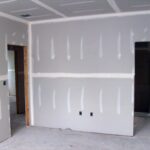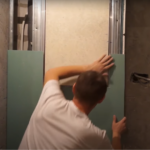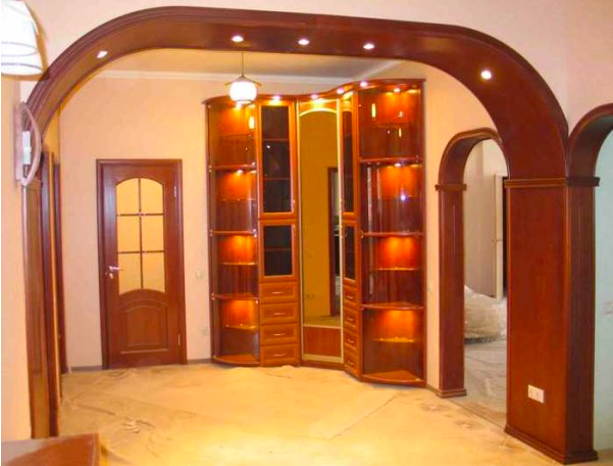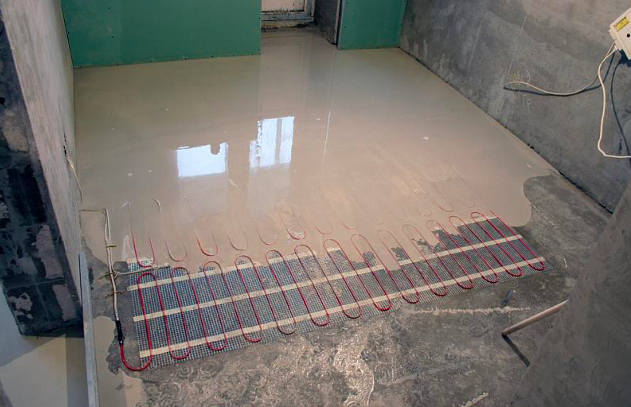Painting plasterboard walls: what to cover, how to paint
Painting plasterboard walls is carried out in several stages, the most important being surface preparation. First, it is cleaned of dust, primed and the joints are sealed. Then they are treated with putty, sanded and primed again, and only after that they are painted. A step-by-step description of the instructions, as well as tips on choosing paint and tools for work can be found in the presented material.
The content of the article
How to choose paint and tools
First of all, you need to understand how to cover drywall. The answer to this question is quite simple - you can use any type of water-based paint:
- water-based;
- water-dispersed;
- acrylic.
Painting drywall with your own hands is most often achieved using water-based compositions. They choose a point not only for residential premises, but also for rooms with high humidity (bathroom, toilet). Acrylics are often used in toilets to produce a rich matte tone or high-shine finish.
The need for paint and tools must be selected. There are 3 ways to paint a plasterboard wall:
- spray gun;
- roller;
- with a brush.
Thanks to the spray gun, you can expand a closed wall with paint, without any smudges. A vacuum cleaner or electric attachment gives approximately the same effect.
If you want to get a textured surface, it is recommended to use a pile length inclination roller:
- for enamel-based paints from 4 mm;
- water-based paint 4-8 mm;
- If the pile is more than 8 mm, the surface is obtained with the most pronounced texture (relief).
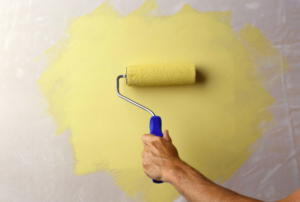
When it is clear which paint for drywall to choose, you also need to take into account the features of its application. So, a regular foam roller will not work for such a surface. In addition, you should make sure that there are different attachments available. In hard-to-reach places it is convenient to carry it with a roller, the shape of the handle can be adjusted.
Finally, there is a classic way to paint plasterboard walls - with a brush. This is the most advanced technology, but the result will be of the highest quality. Great for small areas. If you need to quickly paint a lot of walls, it is better to use a roller or spray gun.
How to paint: step-by-step instructions
Painting plasterboard walls with your own hands is not a very complicated procedure. However, before starting work, it is necessary to carefully prepare the surface, since the quality directly depends on this. The procedure is performed in several stages.
Primer
It’s clear how to paint plasterboard walls – the choice of paints is quite large. But you also need to take a primer and putty with it so that the wall is perfectly smooth. During preparation, it is dusted and cleaned, after which it is primed in one layer. Pay special attention to the joint of the sheets and the places where the fasteners are located. The procedure can be calibrated manually, with a roller, paint brush or using a special spray gun.
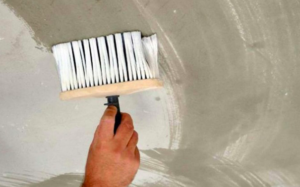
Sealing joints
Before you figure out how to paint a plasterboard wall, you also need to make the joints. When the primer has dried, inspect the screws. They should be slightly recessed into the containing material (no more than 3-5 mm). If the depth is greater, the fasteners are unscrewed and moved to another place.
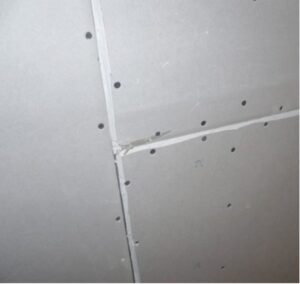
All the junctions of the fragments are puttied, after inserting a reinforced serpyanka exactly into the middle of the seam. It is best to use special compounds, for example, “Volma-shov”. The work is performed with a metal spatula with a narrow surface. Thanks to this, all seams will be covered evenly, without depressions or protruding parts.
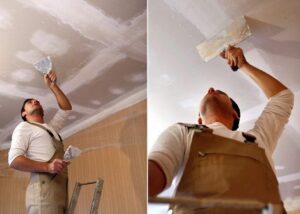
Putty
Having figured out what to cover the drywall with, you also need to putty the surface. This is the longest stage because it takes longer. The sequence of actions is as follows:
- Place plastic perforated corners on each outer corner. They are buried in a previously applied putty, which is then smoothed.
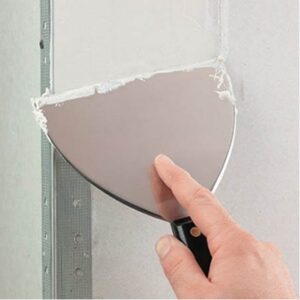
- The inner ends are treated with an angular spatula.
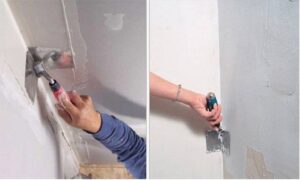
- Take a wide spatula and separate the main surface of the wall. Distribute the mixture over the entire area and immediately level it.
- When the black layer dries, put on a thin top layer and smooth it too. To do this, use a different composition, for example, superfinishing putty.
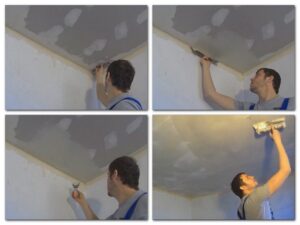
Sanding and second primer
Next, the wall is sanded with a grater and fine-grained sandpaper. You can also go over it again with “zero” sandpaper - this is especially important for internal and external corners. If large flaws are found, they are separated again using putty. When it dries, apply another layer of primer and wait for it to adhere.
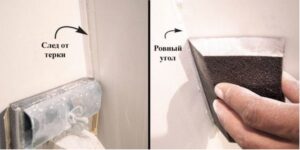
Painting
Now you can start your own coloring. The basic rules are:
- The first strokes are made parallel to the window opening.
- Each subsequent overlaps the previous one by 15 cm.
- When the first layer is dry, apply the second.
- It is not necessary to make a third layer, but if the quality is not satisfactory (uneven coloring), put it on too.

From this review it is clear how to paint plasterboard walls and how to do it correctly. All work can take from several hours to several days. This is due to the need for preliminary preparation of the wall, waiting for the putty and primer to dry. But it is thanks to this that you can get perfectly smooth walls with a rich texture.


